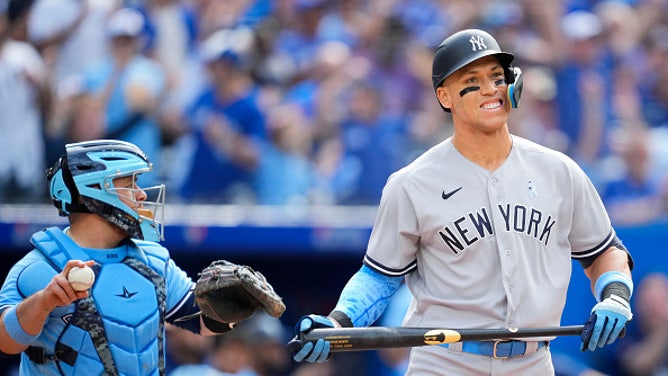Major League Baseball Continues To Have A Big Problem With Offense
Major League Baseball in 2023 instituted a number of rule changes designed to increase pace-of-play, offense and stolen bases. Through two full seasons and an already significant portion of a third season, they've achieved two of their three goals. And the third seems to be getting further and further away.
Pace-of-play in the sport has improved significantly; average game times have decreased. And perhaps more importantly, games feel faster and more action-packed, thanks to less time between pitches. Stolen bases and stolen base attempts are also up, as bigger bases make the risk more worth taking.
What's missing though? That third thing: offense. It's really, really missing.

TORONTO, ON - JUNE 19: Aaron Judge #99 of the New York Yankees reacts to striking out against the Toronto Blue Jays in the eighth inning during their MLB game at the Rogers Centre on June 19, 2022 in Toronto, Ontario, Canada. (Photo by Mark Blinch/Getty Images)
MLB Offensive Stats Continue To Decline
Commissioner Rob Manfred and the league's competition committee worked together in 2022 to make rule changes after years of declining run scoring across the sport. In the 2019 season, an outlier thanks to a juiced baseball, teams averaged 4.83 runs per game.
By 2021, as the league took more control over the manufacturing process, that had dropped to 4.53 runs per game. In 2022 it got much worse, all the way down to 4.28 runs per game. Enter the new rules in 2023.
In theory, banning the shift would lead to more balls hit up the middle becoming singles, leading to more baserunners and more runs. And initially, it seemed to work. Runs per game jumped from 4.28 to 4.62, league-wide batting average went from .243 to .248, and OPS jumped 28 points from .706 to .734.
But in just two and a half years, advances in pitching have clawed back all of those gains. And then some.
Through the first 548 games of the 2025 regular season, offense has once again collapsed. Runs per game are down even lower than they were in 2022, at 4.27. That's an 8% decrease from 2023. The league's batting average is a woeful .235, down from .248 in 2023. As recently as 2017, it was .255. In 2019, it was .252. Just a few short years, and batting average is down 20 points.
As it currently stands, the league's OPS is just .695. Were it to finish at that level, it would be the first time since 1989, another pitching-dominant era, that OPS did not cross .700. The 2019 league OPS was .758, marking another significant drop from just a few years ago.
It's everything: total bases per game stand at 12.70, compared to 14.01 in 2023 and 14.92 in 2019. The league has averaged over 13 total bases per game every season since 1992. There are fewer balls in play this season in an average game 23.90, than there's ever been in baseball history. Literally.
Relatedly, there are fewer hits per game this year, just 7.78 per team, than at any point in the history of the sport.
Put simply, this is not good.
Fans want to see offense, they want to see runs, balls put in play, hits, and action. What they're getting is 100mph flame-throwing relievers with perfectly designed off-speed and breaking pitches completely dominating overmatched hitters.
Pitchers are throwing harder, and more importantly, throwing smarter. And it's making hitting harder than it's ever been. Pitch design, advancements in measuring spin, whether rates or axis, and limitless data on how to attack hitters. It's all contributed. As has a different hitting approach that prioritizes exit velocities and fly balls over line drives.
What can be done about it? Well, not much.
MLB can't tell teams to stop developing their pitchers, or limit velocity or stop the development of devastating breaking balls. Even the few line-drive style players that exist aren't really fun to watch; Luis Arraez was worth just six runs above average on offense in 2024.
It's hard to see how this changes, without artificially limiting the game. Or maybe, just maybe, re-juicing the baseballs. If the trends continue going the way they are, the league might not have a choice.